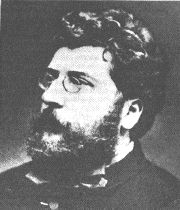Georges Bizet (1838-1875)
(born Paris, 25 October 1838; died Bougival, 3 June 1875).
He was trained by his parents, who were musical, and admitted to the
Paris Conservatoire just before his tenth birthday. There he studied counterpoint
with Zimmerman and Gounod and composition with Halévy, and under
Marmontel's tuition he became a brilliant pianist. Bizet's exceptional
powers as a composer are already apparent in the products of his Conservatoire
years, notably the Symphony in C, a work of precocious genius dating from
1855 (but not performed until 1935). In 1857 Bizet shared with Lecocq a
prize offered by Offenbach for a setting of the one-act operetta Le
Docteur Miracle; later that year he set out for Italy as holder of
the coveted Prix de Rome.

During his three years in Rome Bizet began or projected many compositions;
only four survive, including the opera buffa, Don Procopio
(not performed until 1906). Shortly after his return to Paris, in September
1861, his mother died; the composer consoled himself with his parents'
maid, by whom he had a son in June 1862. He rejected teaching at the Conservatoire
and the temptation to become a concert pianist, and completed his obligations
under the terms of the Prix de Rome. The last of these, a one-act opéra
comique, La guzla de l'emir, was rehearsed at the Opéra-Comique
in 1863 but withdrawn when the Théâtre-Lyrique director, who
had been offered 100 000 francs to produce annually an opera by a Prix
de Rome winner who had not had a work staged, invited Bizet to compose
Les
pêcheurs de perles.
Bizet completed it in four months. It was produced in September 1863,
but met with a generally cool reception: an uneven work, with stiff characterization,
it is notable for the skilful scoring of its exotic numbers. In the ensuing
years Bizet earned a living arranging other composers' music and giving
piano lessons. Not until December 1867 was another opera staged - La
jolie fille de Perth, which shows a surer dramatic mastery than Les
pêcheurs despite an inept libretto. It received a good press
but had only 18 performances.
1868 was a year of crisis for Bizet, with more abortive works, attacks
of quinsy and a reexamination of his religious stance; and his attitude
to music grew deeper. In June 1869 he married Geneviève, daughter
of his former teacher, Halévy, and the next year they suffered the
privations caused by the Franco-Prussian war (Bizet enlisted in the National
Guard). Bizet found little time for sustained composition, but in 1871
he produced the delightful suite for piano duet, Jeux d'enfants
(some of it scored for orchestra as the Petite Suite), and he worked
on a one-act opera, Djamileh. Both the opera and Daudet's play L'arlésienne,
for which Bizet wrote incidental music, failed when produced in 1872, but
in neither case did this have anything to do with the music.
Bizet was convinced that in Djamileh he had found his true path,
one which he followed in composing his operatic masterpiece, Carmen.
Here Bizet reaches new levels in the depiction of atmosphere and character.
The characterization of José, his gradual decline from a simple
soldier's peasant honesty through insurbordination, desertion and smuggling
to murder is masterly; the colour and vitality of Carmen herself are remarkable,
involving the use of the harmonic, rhythmic instrumental procedures of
Spanish dance music, to which also the fate-laden augmented 2nds of the
Carmen motif may owe their origin. The music of Micaela and Escamillo may
be less original, but the charm of the former and the coarseness of the
latter are intentional attributes of the characters. The opera is the supreme
achievement of Bizet and of opéra comique, a genre it has
transformed in that Bizet extended it to embrace passionate emotion and
a tragic end, purging it of artificial elements and embuing it with a vivid
expression of the torments inflicted by sexual passion and jealousy. The
work. however, was condemned for its 'obscene' libretto, and the music
was criticized as erudite, obscure, colourless, undistinguished and unromantic.
Only after Bizet's death was its true stature appreciated, and then at
first only in the revised version by Guiraud in which recitatives replace
the original spoken dialogue (it is only recently that the original version
has been revived). The reception of Carmen left Bizet acutely depressed;
he fell victim to another attack of quinsy and, in June 1875, to the two
heart attacks from which he died.
